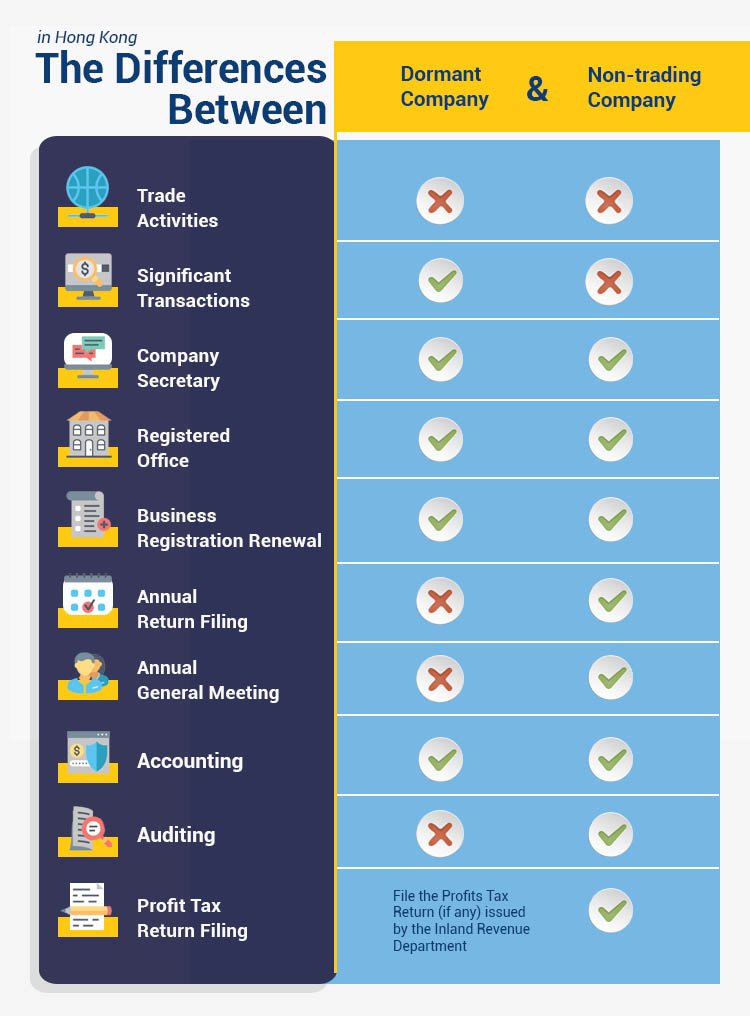As a business owner, you may wish to keep your company on hold for a particular reason. For instance, you’re tired of cost pressure, you move abroad on a temporary basis, or you simply want to take a break.
You can choose to permanently close down your company. Or, you can take time to collect your thoughts before restarting fresh with a dormant company.
In this article, we seek to provide insight into what a Hong Kong company is, and how you can manage and apply for one.
1. What is a dormant company?
A dormant company is a Hong Kong limited company that has NO significant accounting transactions during a fiscal year. The word “Dormant” refers to inactive or inoperative.
Essentially, a dormant company is inactive but still remains a legal entity on the Registrar of Companies (RoC).
Note
A significant accounting transaction is one that the company must enter into its accounting records. For example, the purchase or sale of goods, issuance of dividends, borrowed funds, investment, etc. For more information about the accounting transactions, check out the FAQs of the Hong Kong government
You can establish a dormant company by passing a special resolution for registration with the RoC. Or, you can register your standard company as a dormant company by applying for a “dormant status”. We’ll discuss this in more detail in the below section.
Free ebook
Everything you need to start doing business in Hong Kong
- Company registration process
- Compliance & tax requirements
- Employment & hiring issues

2. What are the pros and cons of a dormant company in Hong Kong
The benefits of being a dormant company
There are several benefits to establishing a dormant company or registering a standard company as one. Let’s walk through some of them:
- Relaunch business with ease
You might often think of closing your company, without being confident it’s the right thing to do.
If you close the company permanently, you cannot use it for future projects and have to set up a whole new company. Moreover, company dissolution can be time-consuming and costly.
Applying for a dormant status allows you to restart easily when you want to, without further procedures or complications.
To get a more accurate idea of how to close down your company, simply read our guide to company deregistration in Hong Kong.
- Hold assets and intellectual property
You can use a dormant company to hold assets or intellectual property. For instance, the dormant company can take responsibility for legal issues or staff management, without having significant accounting transactions.
In many cases, an investment holding company can also be set up as a dormant company to safeguard certain assets or intellectual property.
- Minimum compliance
Your dormant company can be exempted from several legal requirements.
That being said, you’re still required to prepare an annual return for the year in which the company registered as dormant.
- Safeguard company’s brand name
The longer your company exists, the greater your brand name is valued. If you close your company, its name will be available to the public, and you might lose it.
With a dormant company, you won’t need to be active yet still stay legit in the eyes of law and protect your company’s brand, name, and reputation.
The company name reflects your business’s nature and features. Discover how you can successfully register your Hong Kong company name in our dedicated.
The downsides of remained dormant status in Hong Kong
While being inactive in business transactions, a dormant company still being seen as a legal entity. Therefore, it still need to fulfill the requirements and provisions of the Ordinance.
Specifically such as
- Having a minimum of individuals in the registered office or the process of registrar.
- Also the registration also need to be renewed if the business decide to actives.
- A yearly registration fee for businesses is due to the Hong Kong government.
- When the Inland Revenue Department requests it, it can be necessary to file a tax return.
- Last but not least, if a Hong Kong inactive business that has a history of trade activity chose to start up again, essentially ending its dormant status, it would still need to do management accounts/bookkeeping and audit for the time it was dormant.
3. What is the difference between a dormant company and a non-trading company?
Dormant companies and non-trading companies seem to be similar, but there are key differences between them, which you might find useful to familiarize yourself with.
A non-trading company does not engage in any business activities or carry out legal implications. Yet, it’s still required to record accounting transactions.
On the other hand, a genuine dormant company has officially registered for its “inactive” status. Thus, it shall not record any significant accounting transactions other than the above-mentioned ones that are allowed by Ordinance.
Additionally, a dormant company in Hong Kong is exempt from certain liabilities, while a non-trading company is not.

4. How to become a dormant company in Hong Kong?
The main requirement to apply for a dormant company status is that your company has not made any significant accounting transactions.
As mentioned above, you can register a dormant company or apply for “dormant status”.
- Register a dormant company
To register for dormancy, you need to declare your intention with the Registrar of Companies (RoC) through passing and delivering a special resolution.
Step 1: Pass a special resolution with at least 75% of the shareholders’ votes
Step 2: Once the resolution is passed, deliver it to the RoC within 15 days.
Your dormant status will be applied from the date of delivery of the special resolution. If you wish to acquire dormant status on other days, you need to specify your intention.
- Apply for dormant status
If you’re already running a company, and you want to make it dormant, you’ll need to:
(1) Pay any remaining bill (e.g., wages, dividend)
(2) Cancel contracts of the company (e.g., rent, insurance, utilities)
(3) Collect your receivable funds
(4) Pay your VAT (if applied) and cancel the VAT registration of your company
(5) Close down your business bank account (avoid getting interest payment)
After taking these measures, you’ll need to inform the RoC of your intention to become dormant.
5. What are annual compliances for a Hong Kong dormant company?
Although there are certain exemptions for annual compliance, your dormant company is still a legal entity. Thus, you have some requirements to fulfill.
Specifically, your annual compliance requirements include:
- Having a registered office and at least 1 director, 1 shareholder, and a company secretary
- Reporting any changes in the company’s officers or registered office with Registrar of Companies
- Renewing business registration certificate
- Pay the annual business registration fee to the Hong Kong government
- Filing Profit Tax Return if required by the Inland Revenue Department
Every company in Hong Kong needs to maintain good compliant status by fulfilling obligations. Head over to our Hong Kong Company Annual Compliance Requirements for more useful insights.
6. Can Hong Kong companies stop being dormant?
The answer is yes. If you no longer want the dormant status, you can reactivate business activities by going through the same procedure as you apply for it.
This includes passing a special resolution and notifying the Registrar of Companies about your wish for the cessation of dormant status.
In addition, you need to declare your intention to re-conduct significant accounting transactions, which should also be agreed upon by the majority of your company’s shareholders.
An easier way to cease your dormancy without notifying the Roc is by making an accounting transaction.
However, you should consult your company members and shareholders before using this method to avoid causing internal conflict.
7. Conclusion
A Hong Kong dormant company is an ideal option if you want to put the company on hold with minimal costs.
There are multiple advantages to becoming a dormant company, one of which being you can continue operations anytime you want.



